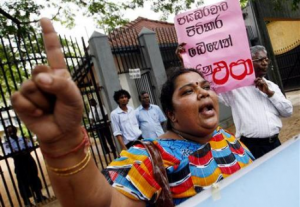“More attention is being given to the problems faced by the migrants,” she says. “Training for the foreign job seekers [has] been given by the Sri Lanka Foreign Employment Bureau, which is very important.”
As hundreds of thousands of women leave Sri Lanka to work in foreign countries every year, many say they are able to earn money to eventually start their own businesses and build houses back at home. But others say foreign employment destroys families and more needs to be done to improve migrant workers’ rights. Nongovernmental organizations, NGOs, and foreign employment agencies are working to help women succeed abroad. Meanwhile, the government has been implementing policies and programs to ensure migrant workers’ safety abroad and create employment opportunities in Sri Lanka.
.....
The current government has introduced a number of policies to enhance the protection and welfare of migrant workers and their families since it came to power in 2005, according to the Central Bank of Sri Lanka’s 2010 annual report.
The government created a separate ministry to regulate foreign employment – the Ministry of Foreign Employment Promotion and Welfare – in 2007. The ministry launched the National Labor Migration Policy in 2009 in consultation with the International Labor Organization to articulate the government’s commitment to a labor migration process that adheres to international guidelines.
The government has also introduced compulsory training programs for migrant workers and has been encouraging youth to receive government training to develop technical skills and enter the technical foreign job market. The government has been promoting education for migrant workers’ children, too.
The government also grants housing loans with lower interest and special insurance plans to migrant workers and their families.
A computer network has been established to maintain links among the head ministry office, regional offices, Sri Lanka mission offices in foreign countries and local recruitment agencies. The government evaluates foreign employment agencies. The ministry has also signed bilateral agreements with the receiving countries, such as Jordan, Qatar, Bahrain and United Arab Emirates, for the security and welfare of the Sri Lankan migrant workers.
The government has also worked to create more job opportunities in the country. For example, it has initiated projects through microfinance institutions to promote self-employment opportunities for women, such as in dressmaking, food preservation and beauty culture. It has been promoting the tourism industry, which creates jobs for women and youth. It has introduced various professional training programs, especially for those who have dropped out of school, but it may take time to see the results of these programs.

A woman shouts in front of the Saudi Arabia embassy during a protest against the torture of L.T. Ariyawathi, who worked as a maid in Saudi Arabia, in Colombo August 30, 2010. A Saudi couple tortured Ariyawathi after she complained of a too heavy workload by hammering 24 nails into her hands, legs and forehead, officials said on Thursday. The message reads, " The steps that has been taken are not appropriate". REUTERS/Dinuka Liyanawatte